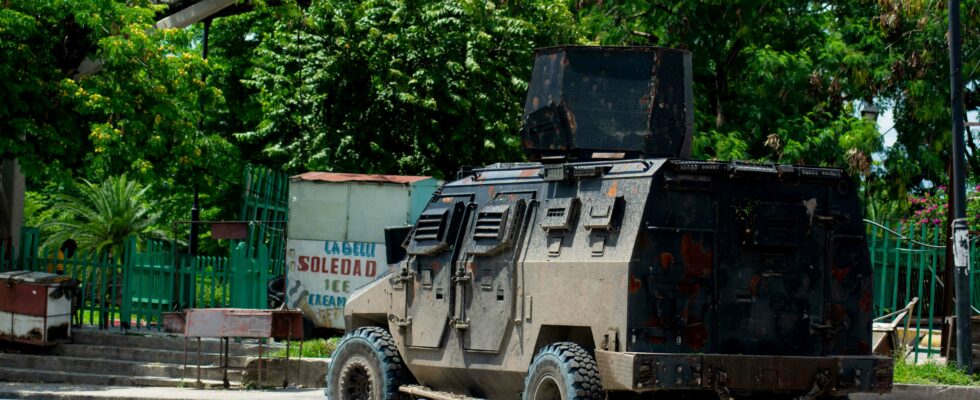The security situation in Haiti cannot wait,” announced Friday, May 24, a spokesperson for the American executive, following the announcement of the homicide in Haiti of three people, including two American missionaries. , in an attack by armed gangs In the process, Kenyan President Willian Ruto, whose country is preparing to lead a multinational force which must restore calm on the island strangled by gangs, announced in an interview. at the BBC that his troops would arrive “in about three weeks.” Kenya and other countries deploying to Haiti will aim to “secure this country and break up the gangs and criminals who have inflicted untold suffering on this country,” William Ruto said.
The president of Kenya said that senior officers had already arrived in Haiti on a reconnaissance mission. He also announced that the joint construction with the United States of a base intended to accommodate the force’s soldiers and their equipment had been finalized “70%”. The mission, supported by the UN, relies on very significant logistical support from the United States – which, however, does not provide men.
Speculation had been rife that a first contingent would be deployed this week, to coincide with Kenyan President William Ruto’s state visit to Washington on Thursday. Ultimately, no announcement was made during this trip, probably because the necessary equipment had not yet been delivered, a Haitian government source told AFP, on condition of anonymity.
Institutional instability
The international force must support the Haitian police in the fight against the gangs which terrorize the population and largely control the capital, Port-au-Prince. Indeed, since February, Haiti has been in the grip of an outbreak of violence, while different competing gangs decided to come together, managing to force the resignation of the Prime Minister, Ariel Henry. According to the United Nations, more than 2,500 people were killed or injured in the first three months of 2024.
A transitional presidential council has been appointed, but it has yet to appoint a prime minister or interim government due to internal power struggles. According to local media, dozens of applications have circulated for the post of Prime Minister and the list was recently sifted.
The United States Embassy in Haiti welcomed Friday on X that the presidential council “has begun the process of selecting a Prime Minister.” “We look forward to a transparent process that will allow Haiti to have a Prime Minister and a transitional government, selected on the basis of technical merit and impartiality,” she said.
How will the gangs react?
The mission of the international force is perilous, with unknowns remaining about how the gangs will react. In recent days, the frequency of attacks has decreased, which could mean they are preparing for a “fairly impressive” attack against the multinational force, said Diego Da Rin, Haiti expert for the International Research Center. Crisis Group who spoke to AFP.
They may also simply be short of ammunition, or follow a “somewhat dual strategy” according to which they continue the attacks, but do not cross “certain red lines, for example the occupation of the presidential palace, to leave the possibility of negotiate with the Haitian authorities,” he said.
“It seems that the gangs are waiting to see what this mission will look like. On the one hand, we see that there is a certain restraint in the attacks, but there are still some quite spectacular assaults” , like the one who recently targeted a prison, Mr. Da Rin told AFP again, interviewed before the death of the three missionaries. And during these attacks, gang members film videos in which they issue warnings to “foreign forces and show what they are capable of doing,” he continued.
The ghost of past interventions
Joe Biden said, during a joint press conference at the White House with the president of Kenya, that the United States would contribute financially, logistically and send equipment to Haiti to support the international force, but that troops Americans would not intervene directly, citing the difficult precedents linked to past interventions.
“The history of American involvement in Haiti is difficult and includes a decades-long occupation, from 1915 to 1934, which left deep resentments among the island’s population. American troops again landed in Haiti in 1994, following a military coup, a mission which made even more Haitians angry”, remarks on this subject the New York Times.
Facing many difficulties, Haiti is sadly accustomed to the deployment of foreign forces: “Over the past thirty years, the United Nations has launched at least six peacekeeping missions in Haiti. International soldiers have restored overthrown presidents , freed them and helped train the Haitian national police, but they also left a dark legacy of sexual exploitation, civilian casualties and deadly diseases. daily.
In 2007, the UN announced that it had sent home around a hundred Sri Lankan soldiers involved in the sexual exploitation of minors. A decade later, a new scandal hit the peacekeepers, for their responsibility in the spread of a cholera epidemic due to the lack of hygiene in a camp of Nepalese soldiers. At least 10,000 people are believed to have died from the disease.
An important American ally
Kenya therefore has the heavy task, under the supervision of the United States, of carrying out this international mission. Haiti is not the only country in crisis where the African country intervenes: President William Ruto mentioned “15 different missions around the world” in which the country is involved, including in neighboring Somalia and the Democratic Republic of Congo. William Ruto said he was also in talks with warring factions in Sudan.
The White House on Thursday designated Kenya as a “non-NATO ally”, a status which elevates the importance of security cooperation between Washington and Nairobi, and will allow the latter to benefit from American military technologies. The alliance also aims to strengthen diplomatic ties between the two countries, as Russia and China expand their influence on the African continent.
